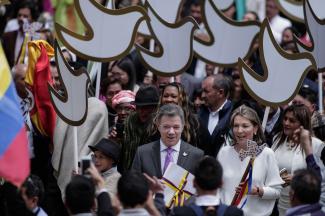United Nations
New approach to conflict prevention

Teresa Whitfield, director of Policy and Mediation of the UN Department of Political and Peacebuilding Affairs, says the new concept will require a radical organisational transformation at the UN: “There will be no more sharp cuts between preventive diplomacy and linear peacebuilding aimed at enduring peace.” The UN now takes an integral approach to thinking through peace processes.
According to Whitfield, this implies there can be no peace without development or without respect for human rights. Peace work needs to take into account new issues such as climate security and root-cause analysis as well as conflict mediation. Aspects such as development and poverty reduction also need to be integrated. But, as Whitfield points out: “Practical implementation is a major challenge, especially in an organisation where a silo mentality prevails.”
However, as the researcher told participants in a Development and Peace Foundation (SEF) online conference on “Crisis Prevention: From Ambition to Action. New Pathways for the UN” in June, she believes the UN has already made considerable progress. The organisation has significantly improved its mediation work, she said, analysing conflicts more intelligently and involving not only governments in crisis intervention and peace work but now also civil society and non-governmental organisations. She also sees a positive sign in the UN leadership’s strong commitment to inclusion and the Sustainable Development Goals (SDGs) with the pledge to “leave no one behind”.
But Whitfield also explained to the conference that the conflicts ongoing today are much more complex and harder to resolve than those in the past. Conflict resolution is complicated by the following:
- Many internal conflicts have an international dimension, which makes them impossible to resolve by traditional methods.
- The armed groups involved are highly fragmented. There are no longer just two conflicting parties such as government and opposition; there are a whole range of players, with different objectives and financial backers.
Examples include the civil wars in Libya, Yemen and Syria. Problems in the UN Security Council make matters worse. All five permanent members have a power of veto, so they can block important decisions. The other, non-permanent members do not have this power and can do practically nothing about it.
Adriana Erthal Abdenur from the Instituto Igarapé, an independent security and development think tank based in Rio de Janeiro, praised the new UN approach at the SEF conference. In her opinion, however, the UN should do more to promote South-South cooperation. So far – she said – South-South cooperation has been understood in extremely narrow terms as technical assistance. At the same time, new actors such as China, India, Indonesia, Turkey and even small states like Timor-Leste are taking innovative approaches to conflict prevention. A vast amount of knowledge and resources is available but not being sufficiently harnessed in the UN process, Abdenur says.
The researcher points to other major innovations at the UN such as the Climate Security Mechanism (CSM), an inter-agency cooperation between the UN Department of Political and Peacebuilding Affairs, UN Development Programme and UN Environment Programme. The CSM is designed to facilitate a more comprehensive UN response to climate-related security risks. Abdenur believes this topic needs to be spread “on a broad base within the organisation”, meaning that all measures and programmes must take climate-related security risks into account.
A great deal has been done in the UN to make processes inclusive. Many measures, such as mediation, have been shifted from governmental level to different actors. One example is Colombia, where after long negotiations and lots of pressure from civil society, a peace agreement was finally reached in 2016 between the government and the country’s largest rebel group, FARC.
Abdenur stressed one point in particular at the online conference: “UN member states and other relevant actors need to be convinced that conflict prevention is not only more economical but also much more effective and saves more lives than a reactive approach.” There is lots of evidence for this, she claimed, referring participants to the UN and World Bank study “Pathways for Peace”.
In a research paper, Abdenur points to another major change that is needed if conflict prevention is to be more than just a buzzword: risk assessment methodologies need to be improved. New technologies such as artificial intelligence (AI) should be harnessed for this. The UN is currently working on innovative techniques that use big data and AI to help assess national crisis situations. The experts hope that with these new methods they will be able to predict crises and conflicts faster and more precisely and ideally prevent them in advance.
Links
Whitfield, T., 2019: Mediating in a Complex World.
https://www.hdcentre.org/wp-content/uploads/2020/05/Mediating-in-a-complex-world.pdf
Abdenur, A., 2019: Making Conflict Prevention a Concrete Reality at the UN.
https://www.sef-bonn.org/en/publications/global-trends-analysis/022019.html
UN and World Bank, 2018: Pathways for Peace: Inclusive Approaches to Preventing Violent Conflict.
https://openknowledge.worldbank.org/handle/10986/28337








